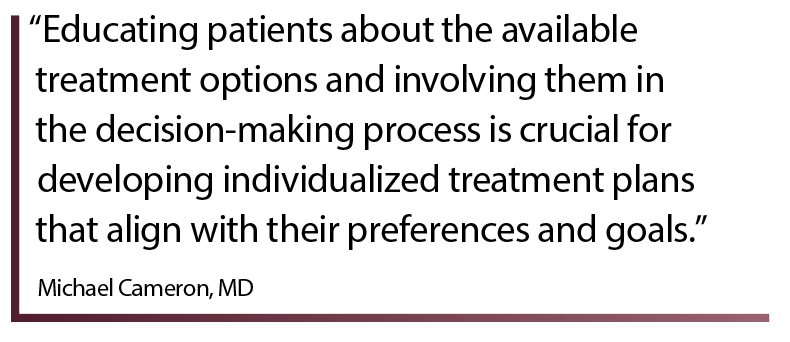- Case-Based Roundtable
- General Dermatology
- Eczema
- Chronic Hand Eczema
- Alopecia
- Aesthetics
- Vitiligo
- COVID-19
- Actinic Keratosis
- Precision Medicine and Biologics
- Rare Disease
- Wound Care
- Rosacea
- Psoriasis
- Psoriatic Arthritis
- Atopic Dermatitis
- Melasma
- NP and PA
- Skin Cancer
- Hidradenitis Suppurativa
- Drug Watch
- Pigmentary Disorders
- Acne
- Pediatric Dermatology
- Practice Management
- Prurigo Nodularis
- Buy-and-Bill
News
Article
Dermatology Times
Frontline Forum Part 3: Challenges and Opportunities to Enhance Psoriasis Management
Author(s):
A panel of experts discusses tailoring treatment to patient needs, supporting patients' mental health, and considering future directions.

Before reading, review part 2 here.
Tailoring Treatment to Patient Needs
The panel emphasized the importance of tailoring treatment plans to meet the specific needs of each patient. Stein Gold highlighted the need for a patient-centered approach, stating, “We need to consider the individual patient’s preferences, treatment history, disease severity, comorbidities, and lifestyle factors when developing a treatment plan.”
This patient-centric approach was further emphasized by Han, who discussed the diverse options available for individualized treatment, stating, “We have 12 biologics for plaque psoriasis on the market, with the newest one hitting the market in 2023. So we have a wide range of options to consider for tailoring treatment to each patient’s unique needs.”
The panelists discussed the considerations involved in selecting the most appropriate treatment for each patient. Shahriari highlighted the need to consider factors such as treatment history, response to previous therapies, disease severity, and the presence of comorbid conditions. “When developing an individualized treatment plan, we need to carefully assess the patient’s previous treatment experiences, including responses and adverse events, to make informed decisions about the most suitable treatment approach,” she said. Kircik emphasized the importance of considering the full range of available treatments, stating, “Regardless of the treatment modality, whether it’s biologics, oral systemic medications, or topicals, we need to consider the combination of treatments to address the unique needs of each patient.”
The panel also addressed the challenges and opportunities associated with individualized treatment plans in psoriasis management. Cameron highlighted the need for ongoing education and shared decision-making, stating, “Educating patients about the available treatment options and involving them in the decision-making process is crucial for developing individualized treatment plans that align with their preferences and goals.”
Han further discussed the evolving landscape of biologic treatments, emphasizing the opportunities for personalized treatment approaches. He stated, “The diversity within the IL-17 family of biologic agents provides opportunities for tailoring treatment to the specific characteristics of each patient’s disease, including considerations such as disease phenotype, comorbidities, and treatment preferences.”

Han is also monitoring adverse events from psoriasis medications, including bowel changes. “Part of the problem to me is that when they first came out, they told us that the diarrhea and those bowel changes would only persist for a week or two during the first month or so of treatment,” he said. “That has not been the case. I have plenty of patients who, years into treatment, plan their day based on when they have access to a clean bathroom.”
Supporting a Patient’s Mental Health
As clinicians craft a treatment plan, the panel addressed the significance of the role they play in supporting a patient’s mental health. Han mentioned a study looking into suicidal ideation as an adverse event in apremilast trials, saying, “This is something that came out of left field, because, truthfully, when you look at any other [condition] cohort, the rates of suicidal ideation behavior are higher in [individuals with] psoriasis compared with the general population.”1
Cameron responded by saying, “From my perspective, [with] apremilast, people come back 2 weeks later and they’re depressed. It’s like that; it happens quickly. There’s an obvious mood shift that can happen with some patients. I can’t think of any mechanistic reason why a biologic would cause suicidal ideation. I don’t necessarily believe that there’s any direct correlation. It’s all disease state from my perspective.”
Stein Gold and Shahriari shared that they always ask patients with psoriasis about their mental health before and during all treatments. “We have a duty to our patients to at least bring it up while they’re taking any [psoriasis] drug to ask whether they are having a problem with depression. It’s common, and we can point them in the direction of help,” Stein Gold said.

Considering Future Directions
The panelists concluded the discussion by highlighting the need for continued research, innovation, and collaboration to further advance individualized treatment plans in psoriasis management. Stein Gold emphasized the importance of ongoing research and development, stating, “As we continue to explore new treatment options and therapeutic approaches, we have the opportunity to further refine and personalize treatment plans to optimize outcomes for patients with psoriasis.” The considerations, challenges, and opportunities discussed among the group of psoriasis experts underscore the importance of tailoring treatment to meet the unique needs of each patient, reflecting the evolving landscape of personalized approaches in psoriasis care.
Reference
- Cowan TL, Wilson A, Murrell DF. Mental health, insomnia and suicidal ideation during treatment with apremilast. Australas J Dermatol. 2022;63(3):403-404. doi:10.1111/ajd.13864






